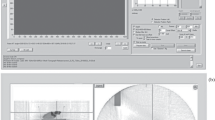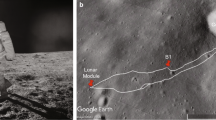Abstract
A series of three replications were run to determine the reliability with which exposure to protons produces a disruption of cognitive performance, using a novel object recognition task and operant responding on an ascending fixed-ratio task. For the first two replications, rats were exposed to head-only exposures to 1000 MeV/n protons at the NASA Space Radiation Laboratory. For the third replication, subjects were given head-only or whole-body exposures to both 1000 and 150 MeV/n protons. The results were characterized by a lack of consistency in the effects of exposure to protons on the performance of these cognitive tasks, both within and between replications. The factors that might influence the lack of consistency and the implications for exploratory class missions are discussed.







Similar content being viewed by others
References
Arkadi D, Bergman H, Fahn S (2014) Redundant dopaminergic activity may enable compensatory axonal sprouting in Parkinson disease. Neurology 82:1093–1098
Bellone, JA, Hartman, RE, Vlkolinsky, R (2012) Low doses of proton radiation do not induce spatial learning or memory deficits in a mouse model of Alzheimer’s disease. Presented at the 23rd annual NASA space radiation investigator’s workshop, Houston, TX
Bogdan R, Carré JM, Hariri AR (2012) Toward a mechanistic understanding of how variability in neurobiology shapes individual differences in behavior. Curr Top Behav Neurosci 12:361–393. doi:10.1007/7854_2011_182
Britten RA, Davis LK, Johnson AM, Keeney S, Siegel A, Sanford LD, Singletary SJ, Lonart G (2012) Low (20 cGy) doses of 1 GeV/u 56Fe-particle irradiation lead to a persistent reduction in the spatial learning ability of rats. Radiat Res 177:146–151
Buonanno M, de Toledo SM, Pain D, Azzam EI (2011) Long-term consequences of radiation-induced bystander effects depend on radiation quality and dose and correlate with oxidative stress. Radiat Res 175:405–415
Casadesus G, Shukitt-Hale B, Stellwagen HM, Smith MA, Rabin BM, Joseph JA (2005) Hippocampal neurogenesis and PSA-NCAM expression following exposure to 56Fe particles mimics that seen during aging in rats. Exp Gerontol 40:249–254
Chappell ET, LeVere TE (1988) Recovery of function after brain damage: the chronic consequence of large neocortical lesions. Behav Neurosci 102:778–783
Clark RE, Zola SM, Squire LR (2000) Impaired recognition memory in rats after damage to the hippocampus. J Neurosci 20:8853–8860
Cowell RA, Bussey TJ, Saksida LM (2006) Why does brain damage impair memory? A connectionist model of object recognition memory in perirhinal cortex. J Neurosci 26:12186–12197
Cucinotta FA, Schimmerling W, Saganti PB, Wilson JW, Peterson LE, Badhwar GD, Dicello JF (2001) Space radiation cancer risks and uncertainties for Mars missions. Radiat Res 156:682–688
Cucinotta FA, Alp M, Sulzman FM, Wang M (2014) Space radiation risks to the central nervous system. Life Sci Space Res 2:54–69
Davis CM, DeCicco CL, Roma PG, Hienz RD (2014a) Individual differences in attentional deficits and dopaminergic protein levels following exposure to proton radiation. Radiat Res 181:258–271
Davis CM, Roma PG, Guida PM, Hienz RD (2014b) Effects of 28Si radiation on neurobehavioral function. In: 25th Annual NASA space radiation investigators’ workshop, Galveston, TX
Denisova N, Shukitt-Hale B, Rabin BM, Joseph JA (2002) Brain signaling and behavioral responses induced by exposure to 56Fe radiation. Radiat Res 158:725–734
Ennaceur A, Aggleton JP (1997) The effects of neurotoxic lesions of the perirhinal cortex combined to fornix transaction on object recognition memory in the rat. Behav Brain Res 88:181–193
Fee MS (2014) The role efference copy in striatal learning. Curr Opin Neurobiol 25:194–200
Galea JM, Ruge D, Buijink A, Bestmann S, Rothwell JC (2013) Punishment-induced behavioral and neurophysiological variability reveals dopamine-dependent selection of kinematic movement parameters. J Neurosci 33:3981–3988
Giedzinski E, Rola R, Fike JR, Limoli CL (2005) Efficient production of reactive oxygen species in neural precursor cells after exposure to 250 MeV protons. Radiat Res 164:540–544
Girdhani S, Sachs R, Hlatky L (2013) Biological effects of proton radiation: what we know and don’t know. Radiat Res 179:257–272
Haerich P, Eggers C, Pecaut MJ (2012) Investigation of the effects of head irradiation with gamma rays an protons on startle and pre-pulse inhibition behavior in mice. Radiat Res 175:405–415
Harrell LE, Barlow TS, Parsons D (1987) Cholinergic neurons, learning, and recovery of function. Behav Neurosci 101:644–652
Joseph JA, Hunt WA, Rabin BM, Dalton TK (1992) Possible “accelerated aging” induced by 56Fe heavy particle irradiation: implications for manned space flights. Radiat Res 130:88–93
Kim M-HY, De Angelis G, Cucinotta FA (2011) Probabilistic assessment of radiation risk for astronauts. Acta Astronaut 678:747–759
Kolb B (1999) Synaptic plasticity and the organization of behavior after early and late brain injury. Can J Exp Psychol 53:62–75
Lindner MD, Plone MA, Francis JM, Blaney TJ, Salamone JD, Emerich DF (1997) Rats with partial striatal dopamine depletions exhibit robust and long-lasting behavioral deficits in a simple fixed-ratio bar-pressing task. Behav Brain Res 86:25–40
Lindner MD, Cain CK, Plone MA, Frydel BR, Blaney TJ, Emerich DF, Hoane MR (1999) Incomplete nigrostriatal dopaminergic cell loss and partial reductions in striatal dopamine produce akinesia, rigidity, tremor and cognitive deficits in middle-aged rats. Behav Brain Res 102:1–16
Lonart G, Parris B, Johnson AM, Miles S, Sanford LD, Singletary SJ, Britten RA (2012) Executive function in rats is impaired by low (20 cGy) doses of 1 GeV/u 56Fe particles. Radiat Res 178:289–294
Manda K, Ueno M, Anzai K (2008) Space-radiation induced inhibition of neurogenesis in the hippocampal dentate gyrus and memory impairment in mice: ameliorative potential of the melatonin metabolite AFMK. J Pineal Res 45:430–438
Marder E, Taylor AL (2011) Multiple models to capture variability in biological neurons and networks. Nat Nuerosci 14:133–138
National Research Council (2008) Managing space radiation risk in the new era of space exploration. National Academies Press, Washington, DC
Neuringer A, Jensen G (2010) Operant variability and voluntary action. Psychol Rev 117:972–993
Parihar VK, Chmielewski N, Allen B, Giedzinski E, Limoli CL (2015) Charged particle effects in the CNS: Dissecting structure function relationships after HZE ion exposure. In: 26th annual NASA space radiation investigators’ workshop, Galveston, TX
Pecaut MJ, Haerich P, Zuccarelli CN, Smith AL, Zendejas ED, Nelson GA (2002) Behavioral consequences of radiation exposure to simulated space radiation in the C57BL/6 mouse: open field, rotorod, and acoustic startle. Cogn Affect Behav Neurosci 2:329–340
Pesek-Cotton EF, Johnson JE, Newland MC (2011) Reinforcing behavioral variability: an analysis of dopamine-receptor subtypes and intermittent reinforcement. Pharmacol Biochem Behav 97:551–559
Poulose SM, Bielinski DF, Carrihill-Knoll K, Rabin BM, Shukitt-Hale B (2011) Exposure to oxygen (16O) particle irradiation causes age-like decrements in rats through increased oxidative stress, inflammation and loss of autophagy. Radiat Res 176:761–769
Raber J, Rola R, LeFevour A, Morhardt D, Curley J, Mizumatsu S, VandenBerg SR, Fike JR (2004) Radiation-induced cognitive impairments are associated with changes in indicators of hippocampal neurogenesis. Radiat Res 162:39–47
Raber J, Allen AR, Rosi S, Sharma S, Dayger C, Davis MJ, Fike JR (2013) Effects of whole body 56Fe radiation on contextual freezing and Arc-positive cells in the dentate gyrus. Behav Brain Res 246:162–167
Rabin BM, Buhler LL, Joseph JA, Shukitt-Hale B, Jenkins DG (2002) Effects of exposure to 56Fe particles or protons on fixed-ratio operant responding in rats. J Radiat Res 43(Suppl.):S225–S228
Rabin BM, Joseph JA, Shukitt-Hale B (2005) Effects of age and diet on the heavy particle-induced disruption of operant responding produced by a ground-based model for exposure to cosmic rays. Brain Res 1036:122–129
Rabin BM, Carrihill-Knoll KL, Carey AN, Shukitt-Hale B, Joseph JA, Foster BC (2007) Elevated plus-maze performance of Fischer-344 rats as a function of age and of exposure to 56Fe particles. Adv Space Res 39:981–986
Rabin BM, Joseph JA, Shukitt-Hale B, Carrihill-Knoll K, Cheng V (2008) Cognitive effects of exposure to protons. Presented at the 19th Annual Space Radiation Workshop, Philadelphia, PA, 30 June–3 July 2008
Rabin BM, Carrihill-Knoll K, Hinchman M, Shukitt-Hale B, Joseph JA, Foster BC (2009) Effects of heavy particle irradiation and diet on object recognition memory in rats. Adv Space Res 43:1193–1199
Rabin BM, Carrihill-Knoll KL, Shukitt-Hale B (2011) Operant responding following exposure to HZE particles and its relationship to particle energy and linear energy transfer. Adv Space Res 48:370–377
Rabin BM, Shukitt-Hale B, Carrihill-Knoll KL (2014) Effects of age on the disruption of cognitive performance by exposure to space radiation. J Behav Brain Sci 4:297–307
Renart A, Machens CK (2014) Variability in neural activity and behavior. Curr Opin Neurobiol 25:211–220
Rizvi A, Pecaut MJ, Gridley DS (2011) Low-dose gamma-rays and simulated solar particle event protons modify splenocyte gene and cytokine expression patterns. J Radiat Res 52:701–711
Robertson IH, Murre JMJ (1999) Rehabilitation of brain damage: brain plasticity and principles of guided recovery. Psychol Bull 125:544–575
Robinson TE, Castaneda E, Whishaw IQ (1990) Compensatory changes in striatal dopamine neurons following recovery from injury induced by 6-OHDA or methamphetamine: a review of evidence from microdialysis studies. Can J Psychol 44:253–275
Rola R, Otsuka S, Obenhaus A, Nelson GA, Limoli CL, VandenBerg SR, Fike JR (2004) Radiation-induced impairment of hippocampal neurogenesis is associated with cognitive deficits in young mice. Exp Neurol 188:316–330
Sanchez MC, Nelson GA, Green LM (2010) Effects of protons and HZE particles on glutamate transport in astrocytes, neurons and mixed cultures. Radiat Res 174:669–678
Schimmerling W, Cucinotta FA, Wilson JA (2003) Radiation risk and human space exploration. Adv Space Res 3:27–34
Shukitt-Hale B, Szprengiel A, Pluhar J, Rabin BM, Joseph JA (2004) The effects of proton exposure on neurochemistry and behavior. Adv Space Res 33:1334–1339
Shukitt-Hale B, Casadesus G, Carey A, Rabin BM, Joseph JA (2007) Exposure to 56Fe irradiation accelerates normal brain aging and produces deficits in learning and memory. Adv Space Res 39:1087–1092
Straume T, Blattnig S, Zeitlin C (2010) Radiation hazards and the colonization of Mars. In: Levine JS, Schild RE (eds) The human mission to mars: colonizing the red planet. Cambridge, MA, pp 803–849
Sweet TB, Panda N, Hein AM, Das SL, Hurley SD, Olschowka JA, Williams JP, O’Banion MK (2014) Central nervous system effects of whole-body proton irradiation. Radiat Res 182:18–34
Villasana L, Rosenberg J, Raber J (2010) Sex-dependent effects of 56Fe irradiation on contextual fear conditioning in C57BL/J mice. Hippocampus 20:19–23
Acknowledgments
The research reported here was carried out under National Aeronautics and Space Administration Grants NNJ06HD93G, NNX08AM66G and NNX13AB73G.
Conflict of interest
There is no conflict of interest.
Author information
Authors and Affiliations
Corresponding author
Rights and permissions
About this article
Cite this article
Rabin, B.M., Heroux, N.A., Shukitt-Hale, B. et al. Lack of reliability in the disruption of cognitive performance following exposure to protons. Radiat Environ Biophys 54, 285–295 (2015). https://doi.org/10.1007/s00411-015-0597-2
Received:
Accepted:
Published:
Issue Date:
DOI: https://doi.org/10.1007/s00411-015-0597-2




